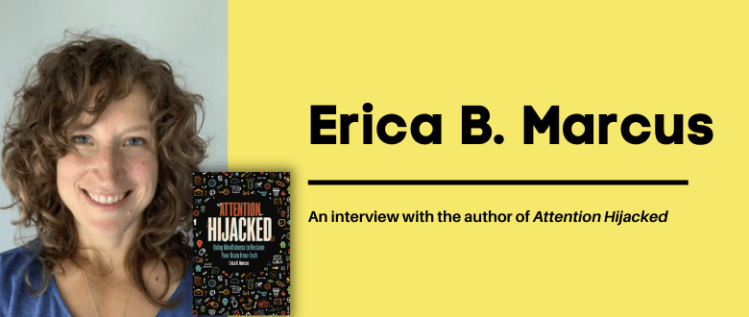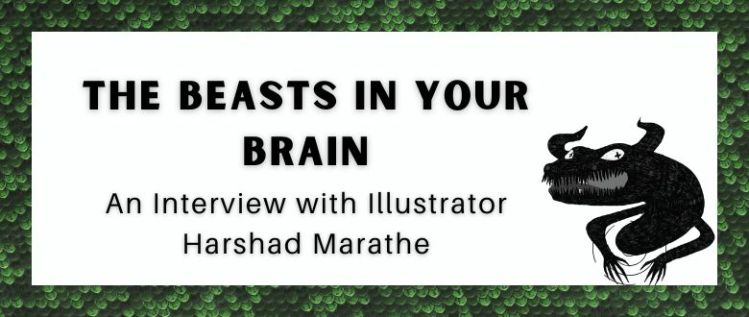Attention Hijacked: An Interview with Author Erica B. Marcus

Technology is constantly at our fingertips, and sometimes we don’t realize how too much screen time negatively impacts our health. Attention Hijacked: Using Mindfulness to Reclaim Your Brain from Tech explores exactly how technology affects consumers, dispels misinformation, and helps readers make personal usage decisions.
Today author Erica B. Marcus joins us to discuss what sparked her interest mindful technology use, her own struggles with tech use, and the biggest surprise in her research. Read on to download a free technology survey for young readers.
Why are you interested in the topic of mindful technology use?
My interest in mindful technology use is personal and professional. On a personal level, I have experienced the powerful draw of my phone, and the ways that not being intentional with it can result in some unhealthy habits. I also find that in my work as a mindfulness educator, technology is such an integral aspect of my students lives that it comes up frequently in discussions of mindfulness. I have been disturbed by how much money and expertise goes into capturing and maintaining our attention. It has felt important to me to draw attention to this manipulation and share ways to use our technology with intentionality.
What is the hardest boundary for you to hold around your own personal tech use? What helps?
If I am not paying attention, I find myself looking at a screen while eating alone. I can have that sense that just eating is “not enough,” and I need to do something else with that time. I find it helpful, before I start eating, to name that I want that time to decompress and enjoy my food. I remind myself that I don’t need nor want) to be doing something productive every moment of the day. When I mind that invitation, put my technology down, and show up to just eat, I find I both savor my food so much more and notice my body’s cues about when I’m hungry and when I’m full. Reminding myself of why I want to put my phone down helps me stay accountable to myself about doing it.
What do you love about screens?
One of my favorite aspects of my screen is being able to work with people from around the world. I was really touched this past year, as I was working for an organization called Mindful Schools, when I would get on a video conference with people calling in from as far away as New York, California, Israel, and even Australia, all from my living room in Maine. We were able to have a shared real-time experience despite our widespread geography. In these moments, I have felt much more a part of a global community than at any other time in my life.
In what ways did your thinking shift through the process of writing this book?
When I started this book, I really had a frame of harm reduction. How do we reduce the negative impact of technology on our lives? How do we limit time on technology so that we can do other things? As I worked through it, however, I shifted towards a way of thinking about how technology can nourish us. What are the ways that we can make our technology use an act of care, towards ourselves and towards others? How can technology help us live our values?
Did anything surprise you in researching and writing this book?
Yes! I gained such a greater appreciation for gaming. As someone who left video games when they got more complicated that Super Mario Brothers, I recognized this was an area I knew little about. I was able to have lots of great conversations with people I admire about why gaming is such a big part of their lives. I now better understand the imaginative potential of living outside the confines of “real life,” and especially the beauty and ingenuity that can go into some of these smaller independently produced games. I feel grateful that I have a better understanding of the ways playing video games can be life-affirming to folks, even if I don’t have those experiences myself.
What is your hope for people who read this book?
I hope this book provides information and questions that give readers an opportunity to examine their own technology behavior more closely. I hope people have a sense of empowerment just in recognizing they have choice, and they don’t have to default to habits and patterns that don’t serve them. I hope readers consider how their tech use impacts not only themselves, but their families, their communities, and even the world at large.
You have kids. How are you approaching their tech use?
My children are still very young, so I get to decide how they interact with technology. But a day will come when that is no longer true. I want to work with them, from an early age, to understand how technology impacts them and help them make healthy choices for themselves. I also have already learned, even with my eldest being four, that complete abstinence from technology does not work for our family. So rather than just saying no, I have tried to educate myself about what the experts suggest for their ages. We have found shows that are helpful for our family in terms of content, and then we set boundaries around time. I hope some day my kids will be able to do this for themselves, and we can continue to have honest conversations about what we notice about how our screen use impacts ourselves and one another.
More Resources for Educators
Erica B. Marcus discusses how to incorporate mindfulness in the library with Teen Librarian Toolbox. Read the full post here!
Download this free Technology Survey to find out how much technology use impacts your life.
Praise for Attention Hijacked
“Cover[s] various aspects of mindfulness, with Marcus advising students what to do about all the busyness we face in this tech-fueled world. . . . lively and deeply relevant work that is a must for school and public libraries.”—starred, Booklist
“A valuable handbook for developing a healthy relationship with technology.”—Kirkus Reviews
“[T]eens will appreciate that the author is not suggesting they turn into Luddites, but rather become masters of both their devices and their time.” -School Library Connection
Connect with the author

Erica Marcus has spent over fifteen years learning from the teens she works with as a classroom teacher, mindfulness educator/director, and a wilderness youth therapy field guide. She is based in Portland, Maine.
To hear more from our brilliant authors and illustrators, click here!




Comments